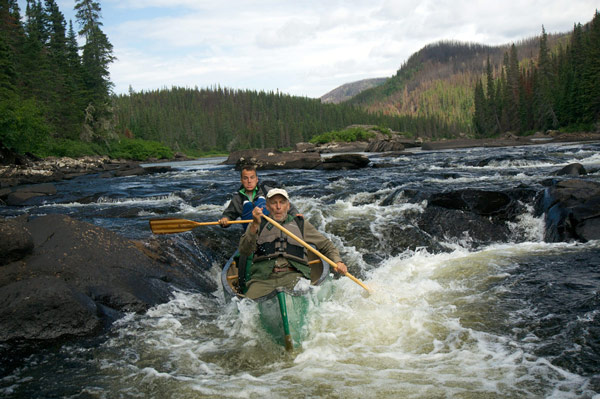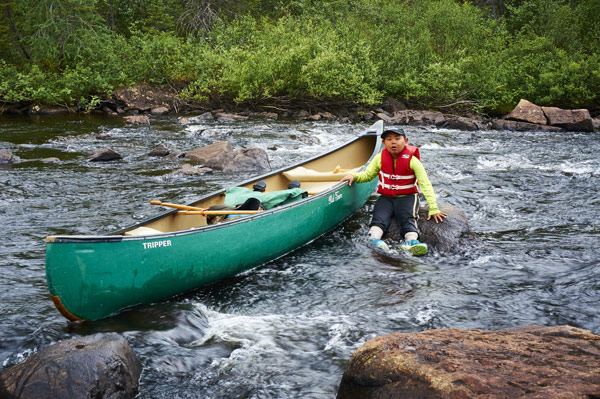Jim Warren ’73 and Ricky Snowball, an Inuit youth from Kangiqsualujjuaq, adventured down Canada’s Moisie River. Warren is president of National Bank of Coxsackie.
In thinking about the manner of one’s death, in this modern age, no consideration is given to being eaten alive. And yet, on our last canoe trip, we were five seconds and two long bounds from three hungry polar bears who were stalking us for breakfast. This trip, we exchanged polar bears for countless black flies. Poor Ricky was their especial target.
Two canoes, four seats. My nephew Myloh Villaronga, my son William ’08, and I signed on. Who would be the fourth? Gazing at a campfire one April night, Myloh floated a name: “Ricky. He’s almost 8.” I thought, 7 or 8; he is still very young to make this trip. Although Will was cool, I deferred to Myloh’s judgment, and the quartet was formed.
This is why I return to canoe the big waters of Canada: Problems are solved directly, and people are helpful.
Ricky Snowball, Myloh’s stepson, is an Inuit youth from Kangiqsualujjuaq on the coast of Ungava Bay, northern Quebec. It was on Ungava Bay (without Ricky) that we repelled the bears. This upcoming trip looked south, to the Moisie River, which descends 420 km from headwaters at the boundary of Labrador and Quebec, through the Canadian Shield, to the St. Lawrence River.
On July 2, 2014, we drove to Ottawa to gather Myloh and Ricky, then headed east and north, a trip of 2,000 km, the last leg on gravel road. In Labrador City, we planned to ship the car by train to Sept Isle. But when we pulled into the train station, we found that the station master had taken an early quit. What to do? The river starts in Lac de Mille, 20 km away. We knocked on doors and windows and roused two young fellows who gave directions like railroad men: “Follow Route 500 until it crosses the tracks three times; then de Mille is a big lake on your right.” Ah, yes, I’m sure we’ll recognize de Mille, but how will we send our car back to the station? The pair, long may they flourish, offered to retrieve the car after their shift. (Eighteen days later, the car would be waiting for us. This is why I return to canoe the big waters of Canada: Problems are solved directly, and people are helpful. May we emulate this in our own lives.)

We launched Friday at 6:00 p.m., paddled south in a honking tailwind, and blew down the big lakes, Menistouc, Opocopa, and Felix, for three long days of sweet cruising.
The only time Ricky gave any cause for concern about his suitability for the journey came on the first night. When we arrived late at a dank campsite, Ricky said, “I want to go.” As a lawyer, I’m trained not to ask a question unless I know the answer. “Go where?” He responded, “Home.”
“We are going home, Ricky,” I replied. “We’re on our way now,” seconded Myloh. “We’ll be there in three weeks,” chimed in Will. I built a blazing fire, Myloh pitched the tents, Will cooked supper, and Ricky forgot about going home.
Ricky was alert and retentive; he always knew what was going on. One afternoon at camp, I was searching for a section of map to write up my journal. “Ricky, where’s map 17?” He promptly replied, “In your blue jacket, right-hand pocket.” And there it was! I had worn the jacket that morning in a drizzle of rain, put it in the pack, and forgotten it. But Ricky remembered.
On another occasion, we had finished lunch on a stony shore and started downstream in a strong current. Ricky cast his eyes to shore and spotted Myloh’s gray camera case, the size and color of the stones. “The camera!” he exclaimed. We quickly paddled to retrieve it — both the camera and the trip’s pictures saved.
One rule for Ricky: Don’t go near the fire while we’re cooking. Reason: Nothing is easier than kicking sand into a frying pan of falafel.
Ricky’s great desire was to be one of the guys. One day, as the rain fell and dark descended, we arrived at the top of a Class III rapid that coursed directly into falls. We had no choice but to get off the water and make camp. The shoreline was a steep bouldered slope surmounted by dense alders — just the type of terrain we had rejected for the last 20 km. We excavated two tent sites by rolling the big rocks aside and smoothing the gravel. Will managed a rudimentary supper of black beans and tea, and there the four of us sat: tired, soaked, under hats and hoods, but Ricky was content because he was shoulder to shoulder with us in a half circle around the fire.
Ricky never whined or complained. He was hardened to irregular mealtimes. At one point, we were negotiating a long stretch of difficult rapids and falls by paddle, line, and portage. A little after noon, Ricky asked, “What about lunch?” I told him, “In a while, when we’re through the rapids.” That answer sufficed; the grown-ups weren’t eating and neither would he, although it is a greater deprivation for a child. Lunch came at 4:00 p.m.

Ricky had begun the journey rambunctious, but soon came to understand that a party of voyageurs organizes itself into a tiny society with rules, for order and safety. One rule for Ricky: Don’t go near the fire while we’re cooking. Reason: Nothing is easier than kicking sand into a frying pan of falafel. A corollary: Don’t throw wood on the fire. But, as inveterate firebugs ourselves, we repealed it.
The second rule: Don’t drown. At the start of one portage trail, on the sheer verge of roaring falls, we pulled the canoes partly ashore to unload. I heard Myloh holler, “Ricky, you’re chest deep in water at the top of the falls!” He was — but he didn’t drown. Second rule obeyed.
Ricky gained the great gift of self-discipline. From that, we gained confidence in our young companion, and the campsite harmony that reigns when chastisement is banished.
As the trip progressed, and the difficult rapids were accomplished, it became clear that there was a benign force supporting us. Against conventional wisdom (and who could say it was false?), Ricky was with us, and of us, and all went well.
Ricky’s only discontent was that we would not let him smoke.







I love this article! It’s so interesting and funny.